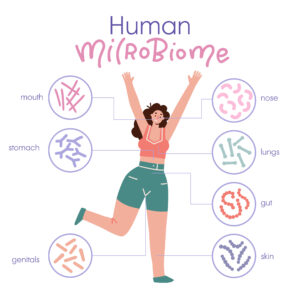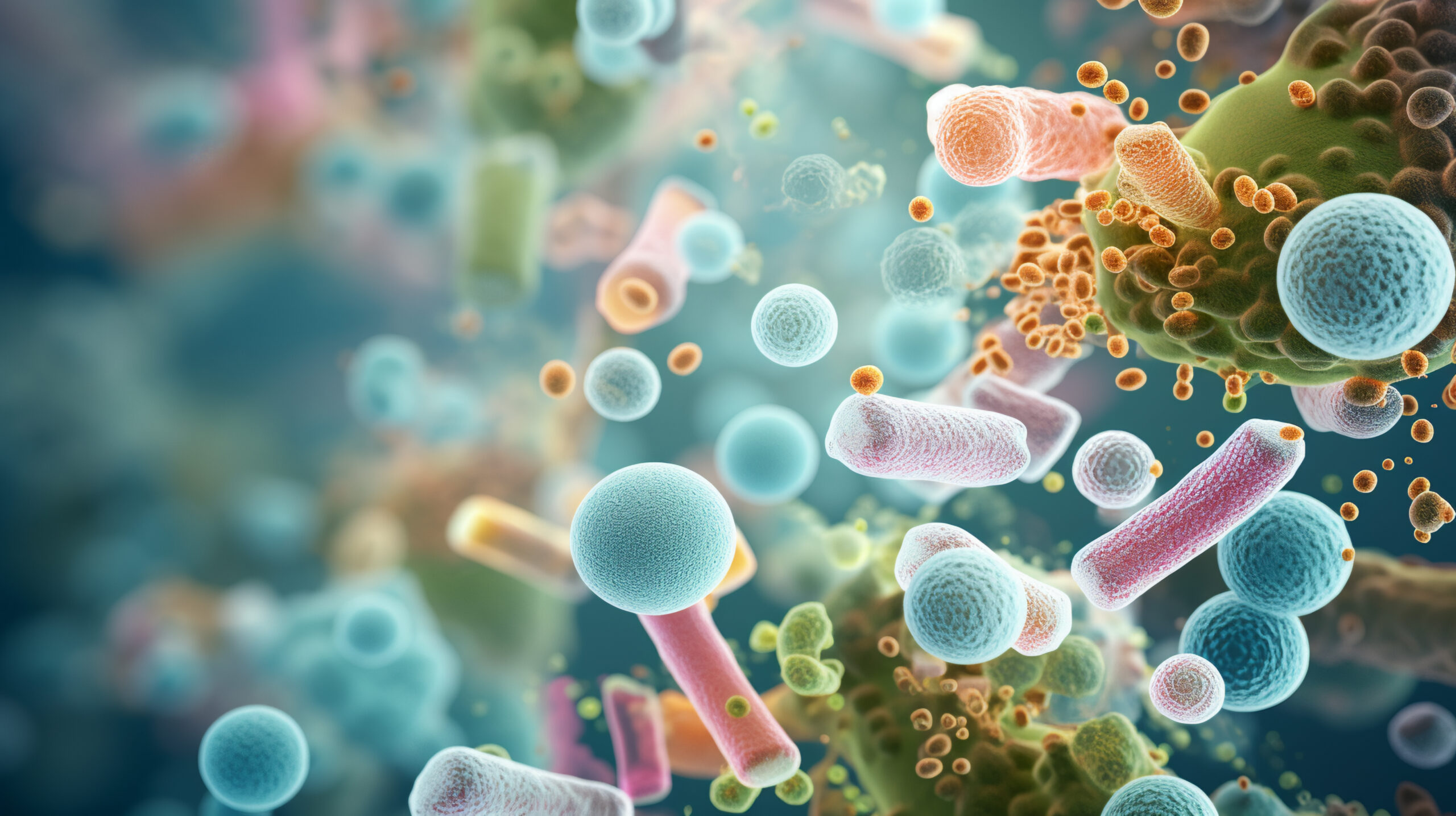From the time we’re born, we share our bodies with trillions of bacteria, viruses, fungi, and other microbes. In fact, your body is made up of as many microbes as there are human cells1. This vast ecosystem of microbes and the genes they encode are collectively known as the human microbiome, and it plays a fundamental role in our health and well-being.
An introduction to the human microbiome

Microbes are found virtually everywhere—from the surface of our skin to the depths of our gastrointestinal tract. Together they form complex communities that interact with each other and with our own cells. Bacteria make up the majority of the human microbiome, and while the thought of bacteria may bring up images of illness and disease, most members of the human microbiome are not only harmless but are actively beneficial for our health. Research has shown that we actually depend on these microbes for several important functions: they help protect us against pathogens, aid in digestion and nutrient absorption, help train and regulate our immune system, and even impact our mood and behaviour2.
While the field of microbiome research is still relatively new, it is becoming increasingly clear that the human microbiome has a major influence on our overall health. Here are just a few of the many important functions our microbiome performs for us every day.
The human microbiome is critical for metabolism and digestive health
We’ve all been told how important it is to feed our bodies well, but it’s also critical to nourish your resident microbes. This is because the microbial community in the gut (known as the gut microbiome) helps make sure you get the most out of the foods you eat. Certain foods contain complex carbohydrates such as fibre that the human digestive tract can’t digest on its own. But the bacteria in the gut can break down these dietary fibres, converting them into short-chain fatty acids (SCFA) or other beneficial compounds that support a range of health-promoting functions. A healthy gut microbiome is essential for proper digestion and nutrient absorption3.
Beneficial microbes provide a protective barrier to keep harmful bacteria out
Every day, your microbiome helps protect you from infection by disease-causing microorganisms known as pathogens. Beneficial bacteria on the skin, in the mouth or other mucosal surfaces, and in the gut work together with your immune system to monitor the environment and fight off pathogens, preventing them from settling in and on your body. They do this by producing anti-inflammatory SCFAs, activating your immune cells, or releasing antibacterial molecules to inhibit the growth of harmful pathogens2,4.
The microbiome plays a major role in the development and regulation of our immune system
In addition to serving as the first line of defence against invading pathogens, the microbiome is a crucial regulator of our immune function. Beginning early in life, bacteria communicate with your immune system, training it to distinguish between harmful pathogens and beneficial members of the microbiome. These bacteria produce compounds such as SCFAs that support the immune system by enhancing gut barrier function (helping to maintain the strength of that physical barrier), contributing to the development and recruitment of immune cells, and preventing inflammation5. The partnership between your microbiome and immune cells is critical for maintaining a balanced immune system.
Your microbiome can influence your mood and mental health
Recent research has uncovered a surprising link between the gut microbiome and the brain, known as the microbiome-gut-brain axis6,7. In this bidirectional communication network, your central nervous system (your brain and spinal cord) and gut exchange signals with each other to regulate things like stress, hunger and fullness. Gut bacteria can also stimulate or produce neurotransmitters and other compounds that influence mood, cognition and behaviour, and imbalances in the microbiome have now been associated with mental health conditions such as depression and anxiety8. This has led some scientists to refer to the gut as the “second brain.”
The take-away
The fascinating world that makes up the human microbiome is an essential part of who we are. Far from being mere passengers in our bodies, these microbial inhabitants play a vital role in our health, influencing everything from digestion and immune function to mental health. As research continues to unravel the mysteries of the microbiome, it has become clear that nurturing this invisible ecosystem is key to maintaining optimal health and well-being.
At the AHMB, our team is building a collection of microbes from the body so that we can continue to advance our understanding of their role in health and disease. To learn more about donating a sample to the AHMB, click here.
References:
- Sender, R., Fuchs, S. & Milo, R. Revised Estimates for the Number of Human and Bacteria Cells in the Body. PLOS Biology 14, e1002533, doi:10.1371/journal.pbio.1002533 (2016).
- Afzaal, M. et al. Human gut microbiota in health and disease: Unveiling the relationship. Frontiers in Microbiology 13, doi:10.3389/fmicb.2022.999001 (2022).
- Sonnenburg, J. L. & Bäckhed, F. Diet–microbiota interactions as moderators of human metabolism. Nature 535, 56-64, doi:10.1038/nature18846 (2016).
- Buffie, C. G. & Pamer, E. G. Microbiota-mediated colonization resistance against intestinal pathogens. Nature Reviews Immunology 13, 790-801, doi:10.1038/nri3535 (2013).
- Zheng, D., Liwinski, T. & Elinav, E. Interaction between microbiota and immunity in health and disease. Cell Research 30, 492-506, doi:10.1038/s41422-020-0332-7 (2020).
- Carabotti, M., Scirocco, A., Maselli, M. A. & Severi, C. The gut-brain axis: interactions between enteric microbiota, central and enteric nervous systems. Ann Gastroenterol 28, 203-209 (2015).
- Wachsmuth, H. R., Weninger, S. N. & Duca, F. A. Role of the gut–brain axis in energy and glucose metabolism. Experimental & Molecular Medicine 54, 377-392, doi:10.1038/s12276-021-00677-w (2022).
- Grau-Del Valle, C. et al. Association between gut microbiota and psychiatric disorders: a systematic review. Frontiers in Psychology 14, doi:10.3389/fpsyg.2023.1215674 (2023).
The information on this website is not intended to diagnose, treat, or prevent any medical condition. See a full disclaimer here.

